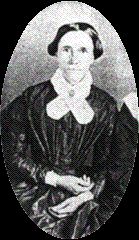While slaveholders, politicians, civil servants, religious leaders and newspaper editors in the Confederacy lament over the losses at Gettysburg and Vicksburg and try to sort out the meanings and repercussions thereof, many ordinary Southerners do the same.
Mary Beckley Bristow is one of those ordinary Southerners. She is a member of the Sardis Baptist Church in Union, Kentucky and a Confederate supporter. Now in the throes of shock and despondency over the news of Gettysburg and Vicksburg, today she confesses to God her confusion and disbelief over the disastrous turn of events in God’s chosen nation.
I do know in my very soul that the Lord will do right, that his power is omnipotent, that he will do his pleasure in the armies of heaven and among the inhabitants of earth, that he controls all things visible & invisible. None can stay his hand or say unto him, “What doest Thou?” Believing this with my whole heart, why should I be so sad, so rebellious? Why should my murmuring heart feel so little disposed to say, “Thy will, not mine, be done.”? That the federals have taken Vicksburg? True, it has been called the Strong-hold of the Confederates. But I cannot see one inch before me. This very circumstance so painfully [occur]ing to me and ten-thousands of others of the oppressed and down trodden South may be for the benefit of our people in the All-powerful hands of Almighty God, as impossible as it seems to us short-sighted mortals. The following lines I wrote on my slate to day,
My heart is deeply sad, O Lord,
No ray of light doth penetrate the gloom,
No promised sweet from Thy blessed word,
My dungeon’s depths illume.My heart is sad; O give me faith
To trust in thee, my gracious God,
O, turn my heart to what “Thou saith”
Teach me to bear Thy rod.Teach my sad heart to trust Thee still
Though heaven & earth should shaken be.
Teach me to know and do Thy will
And cast my care, O Lord, on Thee.
Meanwhile, Confederate forces lose another engagement today, albeit a small one. The Battle of Grimball’s Landing, on James Island, South Carolina, pits a Union amphibious force against Confederate defenses near Charleston. The federals’ effort to divert rebel reinforcements from proceeding to nearby Fort Wagner on Morris Island–while preparations for a Union assault on the fort are underway–is successful. The Confederates take the bait and attack Union forces, only to be confronted by their own disorganization and the island’s marshy terrain. The soldiers of the African-American 54th Massachusetts Regiment, many of whom are Baptists, play a pivotal role in repulsing the enemy, distinguishing themselves in the battle.
Diversionary mission accomplished, the federals withdraw from the island on the morrow en route to Fort Wagner.
Commanding General Alfred Terry later reports of the 54th’s actions during the Battle of Grimball’s Landing:
I desire to express my obligations to Captain Balch, United States Navy, commanding the naval forces in the river, for the very great assistance rendered to me, and to report to the commanding general the good services of Captain Rockwell and his battery, and the steadiness and soldierly conduct of the Fifty-fourth Massachusetts Regiment who were on duty at the outposts on the right and met the brunt of attack.
Sources: Mary Beckley Bristow Journal, July 16, 1863 (link); Battle of Grimball’s Landing (link); Alfred Terry (link); Letter from Luis F. Emilio, July 16, 1863, from “Written in Glory, Letters from the Soldiers and Officers of the 54th Massachusetts” (link)



